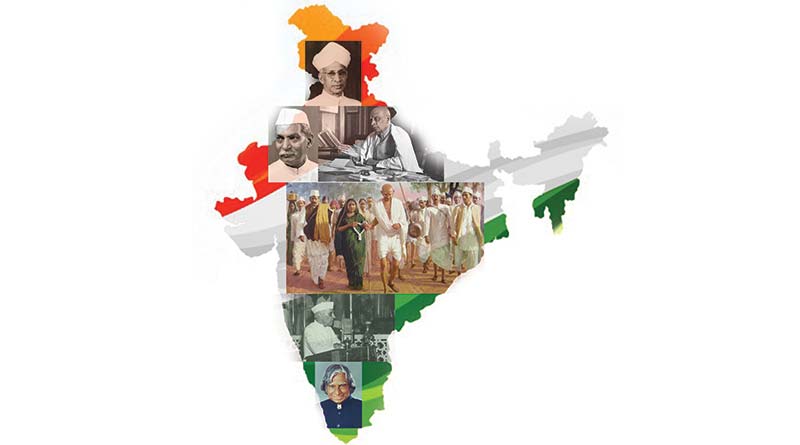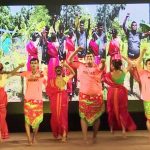Independent India: The New Challenges

August 1947 was the month India became independent. Since then it has become a month of great significance as we annually celebrate the country’s Independence Day. This kindles in every one of us the hope of reformation and a sense of patriotic pride in belonging to this great nation which has secured freedom and independence from foreign domination.
Let us go back in time to when at the stroke of midnight on the 15 August 1947, India awoke to its much-awaited freedom and the tricolour was raised aloft to symbolise our independence to the entire world. Freedom brings to mind the sacrifices of scores of bravehearts on whose tombs our freedom is built. These dedicated freedom fighters, guided by the Gandhian ideology, pursued peaceful demonstrations without any bloodshed.
Among these illustrious patriots was the renowned Barrister Joseph Baptista whose loyalty endeared him to the people and earned him the sobriquet ‘Kaka.’ As a staunch proponent of Home Rule, he was closely associated with Veer Sarvarkar, Lokmanya Tilak, Lala Lajpat Rai and others. However, it was Mahatma Gandhi who first lit the flame of the freedom movement at various landmarks to begin India’s long journey to its midnight tryst with destiny.
The first significant step towards freedom was the announcement in August 1946, of the first all-Indian national interim government at the Centre. It consisted of 14 members and assumed office soon after, on September 2, after the resignation of the Governor-General’s Executive Council.
The new team consisted of Pandit Jawaharlal Nehru, Sardar Vallabhai Patel, Dr Rajendra Prasad, M. Asaf Ali, C. Rajagopalachari, Sarat Chandra Bose, Dr John Mathai, Sardar Baldev Singh, Sir Shafaat Ahmad Khan, Jagivan Ram, Syed Ali Zaheer and Cooverji Hormusji Bhabha.
A year later, at midnight of August 14/15, 1947, Pandit Jawaharlal Nehru, India’s first Prime Minister, made the most striking speech ever by an Indian. His historic words stirred the nation and shall always be remembered by those of that time who were witness to the momentous change. His words are relevant even more today as the country is faced with several challenges.
He declared, and I quote for posterity: “Long years ago we made a tryst with destiny, and now the time comes when we shall redeem our pledge, not wholly or in full measure, but very substantially. At the stroke of the midnight hour, when the world sleeps, India will awake to life and freedom.
“A moment comes, which comes but rarely in history, when we step out from the old to the new, when an age ends, and when the soul of a nation long suppressed finds utterance. It is fitting that at this solemn moment we take the pledge of dedication to the service of India and her people, and to the still larger cause of humanity.
“We end today a period of ill fortune and India discovers herself again. The achievement we celebrate today is but a step, an opening of an opportunity, to the greater triumphs and achievements that await us. Are we brave enough and wise enough to grasp this opportunity and accept the challenge of the future?
“Freedom and power bring responsibility. This responsibility rests upon this Assembly, a sovereign body representing the sovereign people of India…”
Words of wisdom that should inspire and guide future generations of politicians. But sadly lost because the quality of politicians ruling us subsequently is a far cry from the likes of Pandit Nehru, who, it must be mentioned to his credit, had even appointed Dr B. R. Ambedkar as Law Minister, despite a lifelong history of political animosity.
If, at that time, the country had charismatic leaders like Mahatma Gandhi, Pandit Nehru and Sardar Vallabhai Patel, it was due to uniparty governance. The Indian National Congress was the only political party that held sway over the entire nation for a long time and that facilitated its leaders growing in stature. Sadly, it has seen its own demise through rampant corruption in recent years and nepotism. For that matter, none of the existing political components has the courage of its convictions!
Even our Presidents were men of erudition and learning, starting with Dr Rajendra Prasad, Dr S. Radhakrishnan and most others with a few exceptions, and we cannot forget our very own people’s President, Dr A. P. J. Abdul Kalam, who passed away a few years ago, but will live in the nation’s memory forever. At the same time, it must be conceded that the task of our Presidents has become difficult in the present political environment where they have to contend with the present trend of coalition governance. The ruling power and the opposition need to be educated in proper and principled governance, or else we will see the kind of situation being witnessed today. The opposition believes it just has to blindly oppose, like the ruling party did when it sat in the opposition. The result is that parliament is disrupted very often causing inestimable financial loss to the nation!
The time has come that we act as citizens and not slaves, and get ready to resist criminal influences. Today, we need to reaffirm our freedom and loyalty to our country by standing united in the face of aggression by our bordering neighbours, and also in combating the surging Covid-19 pandemic.
Those men of stature worked to put India in line with the leading nations of the world. Regrettably, today’s politicians are interested only in power and pelf, corruption has been self-destructive, and regional parties have emerged to create chaos through linguistic politics. Their leaders have luxurious lifestyles thanks to their vagrant front-runners who keep them well-provided through extortion and looting. Moreover, there are also defiant elements who are a law unto themselves, and get away with openly defying the law.
Where do we stand today? While providing employment and development are the main tasks of the present government, no headway has been made in this direction because the agenda has been diverted to our kitchens and our drawing rooms, name changing of monumental edifices which we would never be able to erect, chanting mantras, issuing condemnations and the like. We see India struggling with a dilemma between development and secularism, instead of secularism and growth?
The Prime Minister’s very efficient PR team ensures his featuring in the print and electronic media daily, and has also ensured condemnation of the violence of hoodlums. But his warnings lack conviction, because some of his ministers have openly encouraged such elements. They are aware the Prime Minister has to give occasional warnings, which they know they are to be ignored. Therefore, it is time the people realize that the country cannot just be left in the hands of any party to do as they like for five years. The time has come that we act as citizens and not slaves, and get ready to resist criminal influences. Today, we need to reaffirm our freedom and loyalty to our country by standing united in the face of aggression by our bordering neighbours, and also in combating the surging Covid-19 pandemic.
Our real leaders of an age gone by commanded respect; today, our babus have to be told to show respect to our elected representatives. Wrongdoers can get away with any crime if they are rich and famous, as we have seen in recent happenings. Yet, we live in a democratic society where liberty gives us the right to choose, and freedom is the result of the right choice. To quote Benito Mussolini, the wartime Italian leader, “Democracy is beautiful in theory, in practice it is a fallacy.”
For more articles like this, subscribe to the print or digital editions of THE TEENAGER TODAY.
Irwin Almeida is a senior journalist who worked with The Indian Express and was a former editor of the East Indian Journal.


